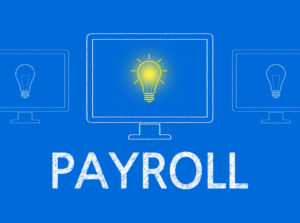We are committed to sharing unbiased reviews. Some of the links on our site are from our partners who compensate us. Read our editorial guidelines and advertising disclosure.
The Ultimate Guide to Payroll
You've just interviewed, selected, and hired your first employee. Congrats—that's fantastic news for your business and bottom line. Now you need to pay your new worker for their hard work. Unfortunately, the process is a lot trickier than simply cutting them a check and sending them home for the weekend.
First, you need to make a series of decisions about how you're going to pay employees, including what pay schedule you'll use and whether you'll run payroll by hand. After a lot of hard work, you'll be ready to dive into the really fun stuff, namely (drumroll please) payroll taxes.
But the right resources—and yep, we're talking about ourselves here—can shed light on the process. While we can't promise to make small-business payroll a good time, we can promise to make it clearer, smoother, and simpler for first-time employers. Ready to dive in? Let's do this.
1. Collect the right employee information
Before your employee can start working, they need to fill out and return a few tax forms that help ensure you both pay them the right wages and remit the right amount of taxes to the government:
- Both salaried and hourly employees need to fill out Form W-4, or the Employee's Withholding Certificate. Employees indicate their filing status (typically married or single), additional taxable income, and dependents, which in turn tells you how much to withhold from their paychecks for remittance to the government.
- Independent contractors need to fill out Form W-9, or the Request for Taxpayer Identification Number and Certification. (Not sure if you’re hiring an employee or a contractor? It’s a little confusing, so check out the IRS’s definition for some guidance.)
- All employees and most contractors, except for those working through a contracting agency, need to fill out Form I-9, or Employment Eligibility Verification. This form certifies that your new hire is eligible to work in the United States.
Note that you do not need to file taxes on behalf of your independent contractors—Form W-9 simply gives you their taxpayer identification number (TIN) so you can send them the right tax forms at the end of the year. You do need to file federal and state income taxes, plus Medicare and Social Security taxes, on behalf of all employees, whether they're hourly or salaried. Form W-4 gives you all the info you need to do so for each employee's unique situation.
Payroll taxes (sometimes called the payroll tax) is a shorthand term for the several distinct taxes you'll withhold from your employees' paychecks and remit to the government throughout the tax year. Payroll taxes can also refer to taxes that you, as the employer, are responsible for matching (or for paying yourself with no required employee contributions). We'll cover the basics of payroll taxes later in the guide, but if you want a more in-depth breakdown, our article on how to calculate payroll taxes can help you out.
Your employees aren't the only ones who need to fill out tax forms before they start working. Employers must register their businesses with the state and federal government to get an Employer Identification Number (EIN). This nine-digit number is a tax ID specific to your business, comparable to a social security number.
You're required to have an EIN whether or not you've hired anyone, so hopefully you already do. If you don't have an EIN, now is definitely the time to stop putting it off and file Form SS-4 requesting one from the IRS.
2. Get workers compensation insurance and choose benefits
With new employees come new responsibilities, the first of which is workers compensation insurance. Whatever insurance provider you go with, it needs to balance cost with coverage—you should be able to afford it, and it should help protect you and your employees in a work-related accident or emergency. Coverage regulations vary by state, so look up your state's requirements before you opt into a plan.
Many payroll software providers and outsourced payroll companies also offer workers compensation options. Depending on your state and provider, you might be able to sign up for a payroll software plan and find a good insurance rate at the same time. Several of our top payroll providers have workers comp options—feel free to take a look.
You also need to figure out which benefits employers in your state are required to offer, plus which ones you want to offer. Benefits can include the following:
- Medical, dental, and vision insurance
- Paid time off (PTO), vacation days, and sick leave
- 401(k) options
- Life insurance
- Wellness programs
- Scholarship options and tuition reimbursement
Federal and state laws naturally determine which of these benefits you'll offer, but beyond that, benefits are largely up to you and contingent upon your workforce, budget, and unique needs. You do need to decide on benefits before your first employee starts working, though, because benefits impact employee take-home wages in the form of paycheck deductions.
For instance, if your company provides a health insurance plan and pays for part of each employee’s monthly premiums, the employee's contribution will be deducted from their paycheck before paycheck distribution. And while payroll taxes and company-specific benefits like insurance make up most of the deductions you'll withhold from your employees' paychecks, there are a few more to be aware of:
- Wage garnishments, such as state-mandated spousal or child support payments
- Voluntary deductions that employees make themselves (for instance, donating to a charity) and request that you withhold on their behalf
3. Decide on a pay schedule
Before you can start paying employees, you need to decide when you'll pay them. Most business owners in the United States opt for one of the following pay schedules:
- Weekly, or 52 paydays/year
- Biweekly, or 26–27 paydays/year
- Semimonthly, or 24 paydays/year
- Monthly, or 12 paydays/year
Your business's pay schedule is important for a few reasons. First, employees need to know how frequently to expect a paycheck so they can budget accordingly. Second, as an employer, you need to have enough cash on hand to pay employees on the schedule you choose.
If you pay employees biweekly, you pay them every other week regardless of the date—for instance, every other Monday. If you pay employees semimonthly, you pay them on two specific days of the week, like the 15th and 30th.
Additionally, some payroll software providers and outsourced payroll companies charge you a fee for every payroll run (which is shorthand for every time you process payroll). With this type of software, businesses on a weekly pay schedule might end up paying more for payroll than businesses on a monthly pay schedule. Other software companies charge by month, not per payroll run, so you can pay employees as frequently as you want without racking up extra payroll fees.
In the end, the pay schedule you choose might be determined by your state. Some states, like Alabama, don't have any pay period regulations. Others, like New York, require employers to pay manual laborers weekly (or semi-monthly with approval from the state). To figure out where your state stands, check out the Department of Labor's list of state payday requirements.
By signing up I agree to the Terms of Use and Privacy Policy.
4. Choose a payroll method
Once you've collected the appropriate documentation, chosen your benefits, and picked out a pay schedule . . . well, you're still not quite ready to pay your employees, but you are ready to set up a method for doing so (the end is in sight, we promise). Most business owners choose one of the following methods to pay their employees:
- Running payroll by hand
- Running payroll with payroll software
- Outsourcing payroll to a payroll company
Running payroll by hand
If you have just a few employees and don't want to pay for software, you can calculate payroll with a spreadsheet template and payroll calculator. But if you go the spreadsheet route, keep a few thoughts in mind:
- Always double- and triple-check your numbers. Withholding the wrong amount in payroll taxes can have major consequences for you and your employees.
- Keep detailed records. To keep a firm grasp on your business's finances (and protect yourself if the IRS comes calling), hang on to financial documents like payroll records for at least six years.
- Distribute pay stubs. Your state might require you to distribute pay stubs, a.k.a. payslips, every time you pay your employees. Pay stubs tell your employees how much they were paid this pay period and, usually, year to date, including all deductions. You can find free pay stub templates online.
For more info on DIY payroll, check out our article on how to run payroll by hand.
Running payroll with payroll software
Payroll software offers a nifty balance between cheap but error-prone DIY payroll and thorough but expensive outsourced payroll. Since most payroll software today is cloud-based, not desktop-based, employers can pay employees on the go or easily share payroll information with their accountants, HR department, or financial team.
Payroll software comes in two main flavors:
- Self-service payroll, which means you calculate and file your own payroll taxes
- Full-service payroll, which means your software provider calculates and files payroll taxes on your behalf, including sending year-end tax forms to the IRS
At first glance, self-service payroll might seem the same as by-hand payroll with a price tag. But self service offers a host of nifty benefits, like easy access to paycheck calculators and tax forms. It streamlines recordkeeping by storing your employees' information, including bank information for fast direct deposit. And most self-service software providers offer an employee self-service portal where workers can clock in and out, check their pay stubs, and request time off.
Full-service payroll
With full-service payroll, your software provider will calculate and file all taxes for you—all you need to do is hit a button to run payroll. (And if your software provides automatic payroll runs, you don't even have to do that much. Just set the system to autopilot and let it do its thing.)
If you choose full-service payroll, make sure your provider includes a tax penalty guarantee. Tax penalty guarantees promise that if the payroll company makes an error while filing your taxes, they'll pay the fine and work to smooth everything over with the IRS. Without a tax penalty guarantee, you'll pay all IRS fines and deal with penalties yourself—even if the mistake wasn't your fault.
And whether you opt for self- or full-service payroll, we strongly recommend finding payroll software that syncs with your accounting software so your payroll numbers transfer directly into your general ledger without you having to lift a finger.
Outsourcing payroll to a payroll company
Payroll software can work well for small-to-midsize businesses, but bigger businesses often need a payroll solution with more heft. If you don't have an HR or accounting department that can handle the ins and outs of payroll, an outsourced service is one potential solution.
Outsourcing your payroll process to another company gives you more time to focus on your business instead of crunching payroll numbers. It's a trade off, though: handing payroll off to another group means you don't have as much control over payroll processes, which can prove frustrating for more hands-on business owners.
And if your business isn't quite big enough for an entire payroll team but you don't have time to spend on payroll, an accountant or bookkeeper to take care of it for you. Some accountants work on retainer, or you can hire one to work in-house full- or part-time.
5. Run payroll
We promised you'd make it here eventually, and now look! It's time to calculate your employees' paychecks, deduct the right amount in taxes and other withholding balances, and make sure everyone goes home happy.
And to recap, no matter which payroll method you choose, you'll need the following pieces of information for each employee:
- Tax withholding information (found on W-4 forms)
- Hours worked for the pay period (for hourly employees) or salaried wages paid per pay period (for salaried employees)
- Additional payroll deductions beyond taxes, including medical insurance premiums, 401(k) contributions, wage garnishments, or voluntary donations
If you're paying your employees via direct deposit, you'll also need their bank information so you can automatically deposit money into their account.
Payroll taxes
You don't need to memorize the name and rate of every type of tax—your paycheck calculator or payroll software lays out payroll taxes into simple categories with built-in rates. But you should know the nature of the beast, so here's a brief overview of the payroll taxes you'll deduct from your employees' paychecks:
- Federal income tax, which is determined by the employee's tax filing status, tax bracket, and other factors
- State income tax, which differs by state
- FICA taxes (Federal Insurance Contribution Act), which are mandatory Social Security and Medicare contributions
As an employer, you'll match your employees' FICA tax contributions. You'll also pay the employer-only FUTA tax (Federal Unemployment Tax Act), which is your mandatory contribution to unemployment insurance.
For more information on payroll taxes, talk to your accountant, bookkeeper, or (depending on how your business is structured) your human resources specialist. Remember, staying legally compliant is crucial to your business's success or failure—make a note of key tax deadlines and stay apprised of current tax rates.
6. Pay taxes and file end-of-year tax forms
Okay, you've deducted payroll taxes from your employees' paychecks: now, it's time to remit them to the federal government. Typically, the IRS requires you to submit taxes monthly or semi-weekly. You can figure out which tax filing schedule you should adhere to on the IRS' site, or talk to an accountant for advice specific to your business and state.
If you use payroll software or an outsourced payroll company, you shouldn't have to worry about remembering deadlines. With both full-service software and outsourced payroll companies, the company will file taxes on your behalf, right on schedule. Some self-service software includes built-in tax reminders, but for an extra layer of security, make sure to stay on top of tax deadlines yourself.
Finally, at the end of the tax year, you need to send tax documents to your employees. Your hourly and salary employees need a W-2 Form, which tells them how much they made during the year and what they paid in taxes. Independent contractors need a 1099 Form, which lists the income they received from you so they file taxes accurately. Some employers send these forms out via mail, but others make them available over employee self-service portals so employees can access them on their own time.
You'll also need to file these forms with the federal government:
- W-2 forms, which report your employees' hours worked
- Form 940, which reports the amount you paid in FUTA taxes
- Form 941, which reports the amount you paid in FICA taxes
Some tax forms (and taxes) need to be filed monthly or quarterly. Others, like employee W-2s, should be filed at the end of the year only. Again, full-service software and outsourced companies take care of this aspect of payroll for you, and if you have additional tax deadline questions, reach out to an accountant.
Payroll glossary
Adding payroll to your list of business tasks often requires a whole new vocabulary—here are the most frequent terms you'll encounter in the wide world of payroll.
Direct deposit: An electronic deposit made directly from your bank account to an employee's in lieu of cash or a check.
FICA tax (Federal Insurance Contribution Act taxes): Federally mandated payroll taxes on employee wages that are withheld for Social Security and Medicare insurance. Employers must match their employees' FICA tax contributions.
FUTA tax (Federal Unemployment Tax Act taxes): Federally mandated payroll taxes paid by employers that help pay for unemployment insurance.
Gross pay: The total amount of pay an employee earns over a pay period before taxes and other withholding amounts are deducted.
Net pay: The remaining amount of employee pay after the employer deducts taxes and other withholdings, like wage garnishments and insurance premiums.
Payslip: A physical or electronic document given to an employee that records their income earned and taxes deducted during a specific time period. Also called a pay stub.
Take-home pay: The amount an employee takes home at the end of a pay period. Usually synonymous with net pay.
The takeaway
Payroll is far from the easiest part of any business owner's job, but a well-run payroll process makes for happy employees, a happy IRS, and a happy business. The first time you run payroll, these six steps might take some time, but keep at it: with the right payroll method at your disposal, you'll be an expert at this in no time.
Need some accounting software to match your new payroll software? Read our guide to the best accounting solutions for small businesses like yours.
Disclaimer
At Business.org, our research is meant to offer general product and service recommendations. We don't guarantee that our suggestions will work best for each individual or business, so consider your unique needs when choosing products and services.





